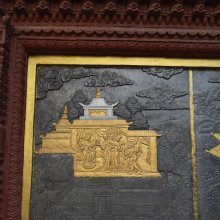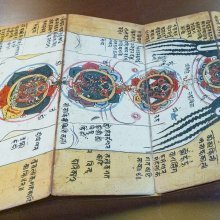Mastery: 1 definition
Introduction:
Mastery means something in Hinduism, Sanskrit. If you want to know the exact meaning, history, etymology or English translation of this term then check out the descriptions on this page. Add your comment or reference to a book if you want to contribute to this summary article.
Images (photo gallery)
In Hinduism
Yoga (school of philosophy)
Source: ORA: Amanaska (king of all yogas): A Critical Edition and Annotated Translation by Jason BirchMastery (of the body) is denoted by the Sanskrit term Siddhi, according to the Amanaska Yoga treatise dealing with meditation, absorption, yogic powers and liberation.—Accordingly, as Īśvara says to Vāmadeva: “[...] Some drink urine, their own impurity and some discharge the saliva from [their] body. Some draw up [their] semen falling from a woman’s vagina after having penetrated [her]. And some who are skilled in circulating vitality through the conduits of the entire body, consume Dhātus. They would not have mastery of the body (deha-siddhi) without [the state of] Rājayoga, in which one's mind is absent. [...]”.

Yoga is originally considered a branch of Hindu philosophy (astika), but both ancient and modern Yoga combine the physical, mental and spiritual. Yoga teaches various physical techniques also known as āsanas (postures), used for various purposes (eg., meditation, contemplation, relaxation).
See also (Relevant definitions)
Full-text (+281): Vasita, Adhipatya, Dharmavashita, Damana, Parishkaravashita, Ten Masteries, Damatha, Jnanavashita, Pranidhanavashita, Citta, Parishkara, Ayus, Cittavashita, Janmavashita, Ayurvashita, Karmavashita, Riddhivashita, Adhimuktivashita, Jitta, Vasibhava.
Relevant text
Search found 185 books and stories containing Mastery; (plurals include: Masteries). You can also click to the full overview containing English textual excerpts. Below are direct links for the most relevant articles:
The Jhanas (by Henepola Gunaratana Mahāthera)
Perfecting the First Jhāna < [Chapter 2 - The First Jhāna and its Factors]
Jhāna and the Arahant < [Chapter 5 - Jhāna and the Noble Disciples]
The Jhānas and Rebirth < [Chapter 3 - The Higher Jhānas]
Maha Prajnaparamita Sastra (by Gelongma Karma Migme Chödrön)
Class (5) liberations, (6) masteries and (7) totalities < [Chapter XXXII-XXXIV - The eight classes of supplementary dharmas]
I. Definition of the immeasurables (apramāṇa) < [Class 3: The four immeasurables]
Preliminary note to liberations, masteries and totalities < [Class (5) liberations, (6) masteries and (7) totalities]
The Great Chronicle of Buddhas (by Ven. Mingun Sayadaw)
Part 6f - Fifteen Kinds of Conduct and Fivefold Higher Knowledge < [Chapter 7 - On Miscellany]
Part 23 - Eight Ways of Mastery of the Mind through Concentration < [Chapter 40 - The Buddha Declared the Seven Factors of Non-Decline for Rulers]
(8) Eighth Pāramī: The Perfection of Resolution (adhiṭṭhāna-pāramī) < [Chapter 6 - On Pāramitā]
In Asoka’s Footsteps (by Nina Van Gorkom)
A Survey of Paramattha Dhammas (by Sujin Boriharnwanaket)
Part 4 - The Development Of Samatha
Chapter 4 - The Three Kinds Of Full Understanding < [Part 5 - The Development Of Insight]
Appendix 1 - To Citta < [Appendix]
Visuddhimagga (the pah of purification) (by Ñāṇamoli Bhikkhu)
Extension of the Sign < [Chapter IV - The Earth Kasiṇa (Pathavī-kasiṇa-niddesa)]
General (Development of Kasiṇas) < [Chapter V - The Remaining Kasiṇas (Sesa-kasiṇa-niddesa)]
C. The Attainment of Cessation < [Chapter XXIII - The Benefits in Developing Understanding]


